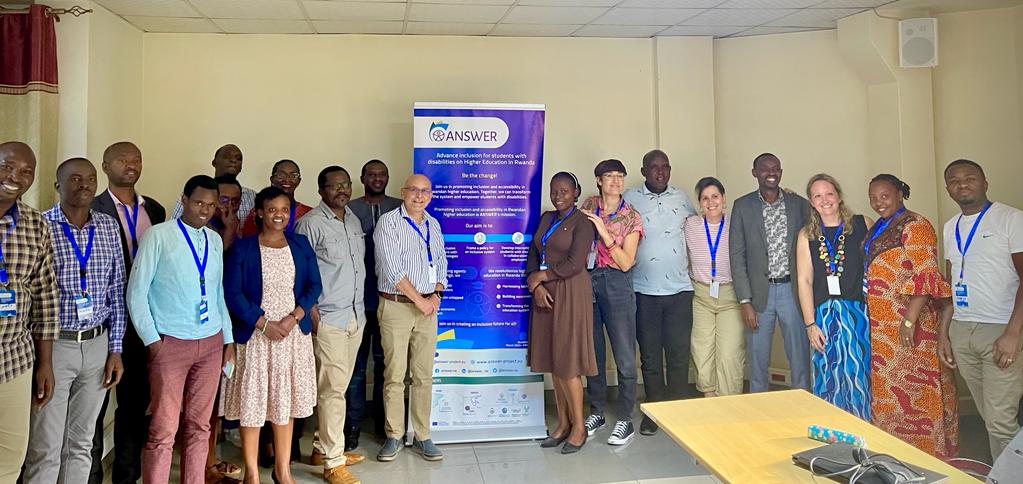In an effort to promote a deeper understanding of human rights and disability, the last ANSWER’s event recently brought together our project’s partners to hold the First Training of Trainers, as well as to discuss key aspects with regard to the project’s progress and next steps. The event, spanning three days, aimed to shed light on the principles and theoretical foundations of human rights, with a specific focus on the rights of people with disabilities. Hosted by the University of Rwanda in Kigali, the training engaged participants in lively discussions, workshops, and debates on a range of crucial topics.

Day 1: Debunking Misconceptions
The first day of the training set the tone by addressing biases and false beliefs about disabilities. Dr. Tomás Ordóñez from the Student Support Centre of the University of Alicante delivered a comprehensive framework to understand common misconceptions surrounding disabilities. Participants engaged in group dynamics and debates, fostering an environment of open dialogue and critical thinking.
The session also emphasised the importance of attitudes when working with people with disabilities. It highlighted attitude theory, best practices, and shared experiences, urging participants to reflect on their own attitudes and biases. The day concluded with a workshop featuring case studies and the development of action plans to promote positive attitudes and inclusivity.
Esther Gallego, representing the Employment Centre of the University of Alicante, discussed fundamental rights and the concept of positive discrimination. The discussion sparked a reflection on how positive actions should be viewed as measures to equalize opportunities rather than as an end in themselves.
Day 2: Theoretical Foundations and Models of Disability
The second day of the training saw experts Anna Soultouki and Ioanna Dimitriadou from the University of Macedonia delving into the theoretical background of human rights and disability rights. They explored the social model of disability and the medical model of disability, emphasising how these models impact the perception and treatment of people with disabilities.
Participants engaged in meaningful discussions about the social model of disability, integration, and inclusion, helping to clarify the terms and concepts surrounding these topics. The day encouraged a deeper understanding of the complexities involved in promoting inclusion and equality.
Day 3: Fostering Inclusivity and Empathy
On the third day, experts Esther Gallego and Tomás Ordóñez from the University of Alicante discussed how to create an inclusive educational environment. They highlighted the role of empathy in eradicating misunderstandings and promoting inclusivity. Practical strategies for cultivating empathy and promoting understanding were shared with participants.
Meanwhile, experts from the University of Macedonia, Anna Soultouki and Ioanna Dimitriadou, explored the concept of self-determination among students with disabilities. They also discussed ways to provide support and facilitate higher education for these students, highlighting the importance of personalised assistance.
Additionally, on September 29th, partners gathered for a Project Management Meeting. During this session, they discussed various aspects, including financial administration, progress in work packages, and expected project outputs. The meeting also addressed the upcoming six-month plan, focusing on needs analysis, assistive technology procurement, blended learning, support center establishment, quality control, and dissemination strategies to enhance project visibility.
This international event served as a platform for fostering a deeper understanding and inclusivity when it comes to the rights and experiences of people with disabilities. By examining theoretical frameworks, challenging misconceptions, and highlighting the importance of empathy and positive attitudes, the event contributed to promoting human rights and social justice for students with disabilities in higher education in Rwanda.





